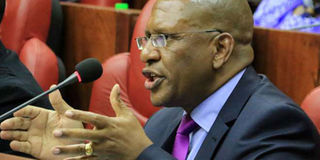Key evidence on ‘Chickengate’ missing: DPP

Director of Public Prosecutions Keriako Tobiko appears before the Joint Select Committee at Parliament Buildings in Nairobi on July 29, 2016. The DPP has recently come under criticism from a section of the public over apparent delays to take action on the EACC file. PHOTO | JEFF ANGOTE | NATION MEDIA GROUP
What you need to know:
- Investigators targeted former commissioners and staff of the defunct Interim Independent Electoral Commission (IIEC).
- Mr Nicholas Charles Smith, 43, was jailed for three years by a British Court for bribing IIEC and Kenya National Examinations Council (KNEC) officials to win printing contracts.
The Ethics and Anti Corruption Commission (EACC) is yet to provide key evidence on the “Chickengate” scandal to enable the Director of Public Prosecutions to proceed with the cases.
According to a statement from the DPP’s office, the file that was handed over by EACC on July 19 did not include “evidentiary material” obtained from the Serious Fraud Office of the UK as well as witness statements.
“The EACC has confirmed that the issues raised by the DPP are being addressed,” the statement read.
The DPP has recently come under criticism from a section of the public over apparent delays to take action on the EACC file.
In July, the agency recommended criminal charges against four people tied to the scandal, including former Independent Electoral and Boundaries Commission chief executive James Oswago, Trevy Oyombra, Hamida Ali Kibwana and Kenneth Karani.
The anti-graft body said it found “evidence of criminal culpability on the part of the four persons”.
Kenyan electoral officials are alleged to have received hefty bribes, codenamed “chicken”, totalling Sh52 million.
Outgoing IEBC chairman Issack Hassan was also exonerated from corruption allegations in the Chickengate scandal report.
Before handing over the initial report to the DPP, the anti-graft body had similarly been accused of unnecessarily delaying the investigations and prosecution of the matter.
Investigators targeted former commissioners and staff of the defunct Interim Independent Electoral Commission (IIEC).
A British government report sent to the Attorney-General had named commissioners and tender committee members who allegedly received money from Smith and Ouzman to help the firm win a ballot paper printing tender.
Mr Nicholas Charles Smith, 43, who was Smith & Ouzman Ltd sales and marketing director, was jailed for three years by a British Court for bribing IIEC and Kenya National Examinations Council (KNEC) officials to win printing contracts.
Smith’s father, Mr Christopher John Smith, 71, the chairman of the company, got an 18-month suspended term for his role in the scandal in which top electoral commission and Knec officials pocketed millions.





